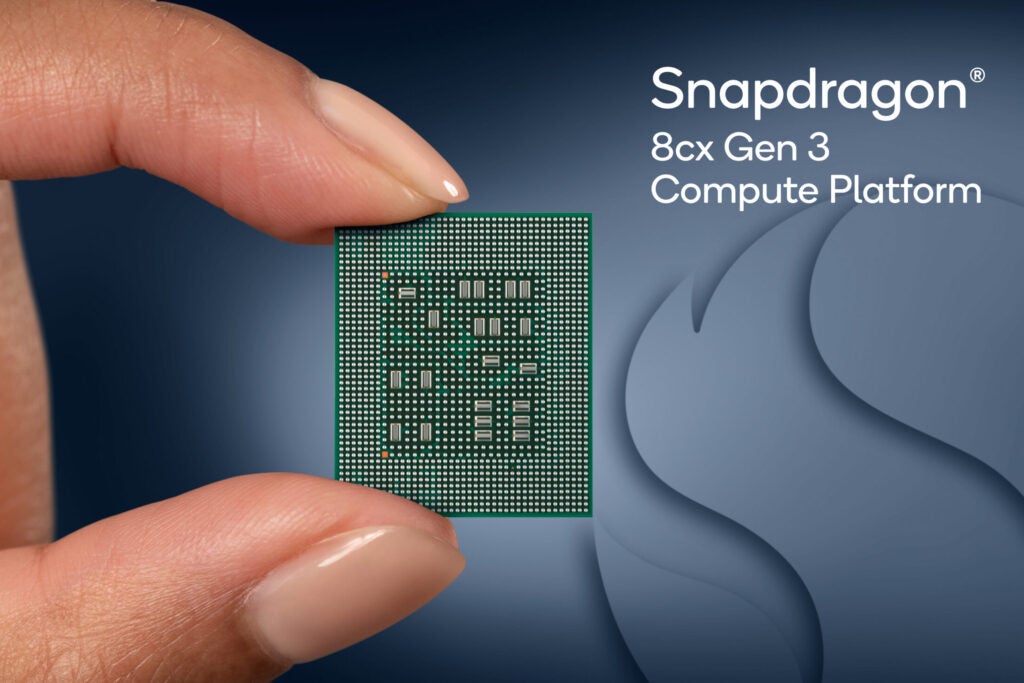Snapdragon 8cx Gen 3 vs Snapdragon 8cx Gen 2: What’s new?

Qualcomm has announced its latest flagship laptop chip, but how does it compare to the previous generation? We’ve rounded up all of the major differences in this Snapdragon 8cx Gen 3 vs Snapdragon 8cx Gen 2 face off.
Of course, Snapdragon 8cx Gen 3 laptops won’t be available to buy until next year, so we can’t comment on benchmark results ourselves right now. But Qualcomm has released a lot of details about the new chip, so we’re using their claims for comparison instead.
So without further ado, here are the main differences between Snapdragon 8cx Gen 3 and Snapdragon 8cx Gen 2:
The new chip uses a new 5nm node
Qualcomm has confirmed that the Snapdragon 8cx Gen 3 is the first chip intended for Windows laptops to feature a 5nm node. For comparison, the Qualcomm Snapdragon 8cx Gen 2 uses a 7nm node from Samsung.
With smaller nodes typically providing a speedier performance, this means the Snapdragon 8cx Gen 3 should be more powerful than its predecessor.
Being able to launch a 5nm node is very impressive, with AMD and Intel yet to do so. Qualcomm isn’t the first maker to be launching a 5nm laptop processor though, with Apple beating it to the punch with its M1 chip.

The new CPU is 85% faster
As expected, the new Snapdragon chip is noticeably faster than its predecessor. Qualcomm suggests the CPU is 85% faster than its predecessor when it comes to multi-threaded workloads. This means laptops will be better able to juggle multiple tasks simultaneously, presumably seeing less slowdown when you’re using multiple web browsers or apps.
You’re also getting a 40% performance boost for single-threaded workloads here, which is particularly important for the likes of gaming. So to sum up, the Snapdragon 8cx Gen 3 should see a noticeable performance upgrade over its predecessor.
Gen 3 is better equipped for gaming
Let’s be clear, the Snapdragon 8cx Gen 3 is hardly going to be powering any high-end gaming laptops anytime soon, but Qualcomm is still making efforts to improve the gaming performance.
The Snapdragon 8cx Gen 3’s Adreno GPU is apparently 60% faster than its predecessor, resulting in a faster performance for gaming as well as content creation.
Qualcomm suggests the new chip will support 1080p gaming with a refresh rate as high as 120fps. Of course, you’ll likely only be able to hit that peak performance with entry-level games, but it’s still good to see you’ll be getting a performance grade with the Snapdragon 8cx Gen 3.

Faster internet download speeds
Laptops featuring the Snapdragon 8cx Gen 3 won’t just be faster in terms of the CPU and GPU, but it will also be able be capable of faster downloads speeds when connected to the internet either via 5G or Wi-Fi.
The new 5G Modem-RF system is capable of 10Gbps download speeds, while the Snapdragon 8cx Gen 2 is limited to peak download speeds of 7Gbp. There’s a big catch though, as users will be able to make use of these speeds with access to 5G mmWave. This technology is currently only available in the US, China and Japan, although there are plans for it steadily roll out to additional countries.
But if you have a Wi-Fi 6E router, you will at least be able to take advantage of download speeds of up to 3.6 Gbps. Qualcomm claims the jump up from Wi-Fi 6 to Wi-Fi 6E results in a 50% faster download speed.








